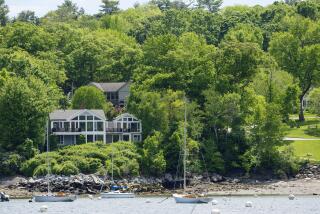Rock-Bound and on a Roll in Maine
- Share via
In the morning we set out from Boston for Bar Harbor, leaving Massachusetts behind to follow the coast of New Hampshire and then the rock-bound coast of Maine. Rock-bound it was; a series of beach towns with fine homes of clapboard or shingles set perilously close to the sea.
The beach concessions, some of the motels and most of the houses were already shut down for the winter. The Atlantic was truly in a fury. Big waves lashed the beaches and smashed into the rocky bulwarks. A few hardy surfers were out in their wet suits. Otherwise the resort towns seemed almost deserted.
Near Seabrook, N.H., we had passed an enormous domed concrete structure not far above the ocean. It might have been a pleasure palace; but like most of the houses it looked deserted. Our tour guide, Jeanne Eagleson, told us it was a nuclear power plant that had never been on line. Public hostility had kept it idle for years.
Farther on, near Wiscasset, Me., we saw two beached schooners, rotting on the rocks. Ms. Eagleson told us they had been built just before the advent of steam and had never sailed. They were the Hester and the Luther Little.
Like the atomic plant, they had been victims of bad timing; the schooners had been built too late; the atomic plant too soon.
The next morning I read in the Bangor Daily News that a man and his 11-year-old daughter had drowned that day in the surf at York Beach, which we had passed through. They had gone down to stand on the rocks and watch the waves, and the wife and mother watched in horror as she saw them swept away. The man was Terry Hundley, 41, town administrator of Durham, N.H. Their bodies had not been recovered. Not far away, at Ogunquit, an 11-year-old boy had drowned at almost the same time.
Bar Harbor was neat, clean, pretty, rustic and cold, like most Maine towns. After the turn of the century it had been discovered by the New York rich, and many plutocrats had built ostentatious summer homes along its wooded shores.
During the Great Depression, though, these palatial piles became financial liabilities; their owners were miraculously relieved of this burden by a fire that destroyed most of them. Ms. Eagleson pointed out a surviving mansion, on Frenchman’s Bay, which she said had been built by a Princeton professor for his European bride. But she never arrived; she sailed for America on the Titanic.
That evening we stayed at the Bar Harbor Inn and had a glass of wine before dinner in a cocktail lounge overlooking the bay. A pianist was playing such nostalgic standards as “Lili Marlene,” “Come Back to Sorrento” and “Red Sails in the Sunset.” Tears came to my wife’s eyes. “Red Sails” had been one of our songs.
A man who looked like Stuart Whitman walked toward our table, gave me a perfunctory nod, knelt on one knee, looked up at my wife, said, “I have been coming here two years, and you’re the prettiest lady I’ve seen.” He stood, bowed slightly, and walked away.
I said, “That man looked like Stuart Whitman.”
“Yes,” my wife said, “he did.”
I don’t know whether it was part of the tour or not, but it didn’t hurt.
That night we dined at the inn and my wife ordered the famous boiled Maine lobster. I sensed that she was slightly disappointed. “I think I’m losing my sense of taste,” she said.
I laughed. “Don’t be silly,” I said. But I was worried. For a woman of her appetite to lose her sense of taste would be a disaster of unimaginable gravity. It would be something like Beethoven’s losing his hearing.
We got back to our room in time to see Kirk Gibson homer in the 12th inning to give the Dodgers a 1-run lead; then saw Orel Hershiser pitch in relief to shut down the Mets and tie the series at 2-2.
I remembered a letter I had received from a reader several weeks earlier when I predicted that the Dodgers would win the pennant. I had filed it away. “The Dodgers are not going to win the pennant this year,” he had said, “simply because they can’t beat the Mets.”
Well, we would see.
More to Read
Sign up for The Wild
We’ll help you find the best places to hike, bike and run, as well as the perfect silent spots for meditation and yoga.
You may occasionally receive promotional content from the Los Angeles Times.






